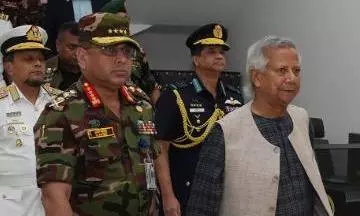
Why India needs to consider Bangladesh's offer for Modi-Yunus meeting
New Delhi has to consider interests of its troubled north-east even as it envisages two transnational economic corridors; Yunus also likely to first meet with Chinese President

India’s response to Bangladesh’s request for a bilateral meeting between chief adviser Muhammad Yunus and Indian Prime Minister Narendra Modi, on the sidelines of the upcoming BIMSTEC summit in Bangkok, hinges on multiple critical issues.
At this point, India has officially neither accepted nor rejected the offer carefully assessing its options amidst renewed instability in Bangladesh due to a cold war between the army and the newly formed student-led political party.
Two transnational economic corridors
While taking a call on the proposal, New Delhi will have to consider the interests of its landlocked and troubled north-east as it envisages two transnational economic corridors to boost the region’s connectivity and economy.
The first proposed rail-cum-road corridor passes through Bangladesh to connect Hili in South Dinajpur district of West Bengal with Mahendraganj in Meghalaya’s West Garo Hills, said sources in the North Eastern Council (NEC) in Shillong.
Also read: Why Bangladesh student leaders, Army look set for final showdown
The ₹7,000 crore project will reduce the distance between the two connecting points to about 150 km, shortening the distance by around 445 km.
India’s Railway Board has cleared the project while the National Highways and Infrastructure Development Corp Ltd has prepared a road-alignment analytic.
The project is awaiting a green signal from the Bangladesh government.
The corridor can cut the distance between Kolkata and Meghalaya by around 500 km, significantly reducing cost and time, said Meghalaya chief minister Conrad Sangma.
Second corridor
The second corridor aims to connect Bhutan with the Phulbari Ghat river port in West Garo hills and then to the Bay of Bengal in Bangladesh, the sources added.
There is already an existing road link between Paikan in Bhutan and Dalu in Meghalaya.
Also read: Bangladesh slams US intelligence chief Gabbard's remarks as 'misleading, damaging'
The Bhutan-Meghalaya project will not achieve the desired objective unless it is linked to nearby ports in Bangladesh, experts say.
The Meghalaya government reportedly urged the Centre earlier this month to expedite the projects and take up the matter with Bangladesh.
The fate of the two projects will ultimately depend on the de-escalation of tension between Dhaka and New Delhi.
Strained ties hit projects
Many infrastructure projects in the north-east involving Bangladesh are already stalled because of the deterioration of ties.
The Akhaura-Agartala railway project worth around ₹1,000 crores; a 1.9-kilometre-long friendship bridge over the Feni river built at a cost of ₹133 crores to connect Sabroom in Tripura with Ramgarh in Bangladesh, and connecting the north-east with industrial value chains in the Bay of Bengal region through the Matarbari deep-sea port in Bangladesh, are some of the projects currently in jeopardy.
“India should not scale down its engagement with Bangladesh for the larger interest of the region,” opined former Nagaland chief minister KL Chishi.
Also read: Amid growing turmoil, debate over Awami League’s poll ban splits Bangladesh
Myanmar troubles
The engagement has become more crucial for the north-east as India’s plan to have an eastward gateway for the region through Myanmar, as outlined in the Act East policy, is in deep water due to the ongoing civil-war in that country.
Bangladesh’s offer for a highest-level meeting with India assumes further significance as Yunus is likely to have his first bilateral meeting with Chinese President Xi Jinping on March 28, just a couple of days before the Bangkok summit from April 2 to 4.
“It signifies that the interim government in Dhaka is cautious about maintaining a balance with its two powerful neighbours,” said political commentator Amal Sarkar, who keenly follows Bangladesh.
Also read: Bangladesh demands Hasina's return; what are India's options?
Yunus-Xi meet
Before deciding on the Bangkok meeting, New Delhi will like to see the outcome of Yunus’ March 25-28 China tour. India’s external affairs minister S Jaishankar reportedly told a parliamentary panel that Dhaka's proposal is under consideration.
The fluid internal developments in Bangladesh at present might also end up determining India’s decision.
The army has increased its presence on the streets of Bangladesh, particularly in Dhaka ever since it was accused by a top leader of the nascent student-led National Citizen Party (NCP) of plotting the rehabilitation of deposed prime minister Sheikh Hasina’s Awami League.
The students who led the agitation to topple Hasina's regime in August last year floated the party to take part in the country’s next elections.
The NCP is also at odds with the Yunus government over the issue of banning the Awami League.
